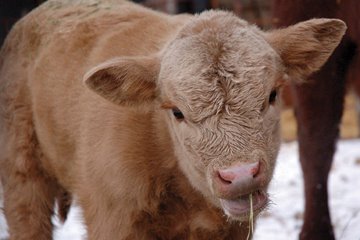
by Matthew Wright
For over 100 years, Canada’s top agriculture scientists have been developing some of the most advanced research on agricultural practices at the Brandon Research Centre (BRC). Today that still holds true at the almost 3,300 acre complex that straddles the boundaries of Manitoba’s self described Wheat City.
Shannon Scott and Hushton Block are the two scientists who run the Beef and Nutrition program at the BRC. With 16 projects currently on the go, to say there’s no shortage of work would be an understatement.
Along with two grad students, Scott, who’s been there since 1999 and Block, who’s been there for a year, focus their energies on improving forage based beef production systems. Not only do they have the land base required to do their studies, but a 500 plus cow herd as well.
Of the many projects currently under way, there are two that Scott is looking forward to moving along.
The “Time of Calving” project will determine if early calving (March/April) or late (May/June) calving is more economically beneficial to producers in Western Canada.
Preliminary test results indicate that calf average daily gain was slightly lower for the June calving system but that the delaying of the calving season into summer may be an efficient way for producers to reduce winter feeding costs.
The “Rested Grazing” project is looking at the effect of resting perennial pastures during the critical period on productivity, alfalfa persistence and water use efficiency.
Scott said that none of what they do would be possible without the extraordinary degree of collaboration of many people.
“I’m just so grateful for all the collaborators involved in this program. The University of Manitoba has provided us with research students to analyze sometimes seven years of data. We’ve pulled in other members from other departments at the centre. If the MCPA didn’t step up by providing funding and get the government involved, I don’t know if these projects would be going,” she said.
In fact, Assistant Deputy Minister, Allan Preston, who was on had at the centre last week for a pasture tour announced that his department would be putting in a full-time research position to help Scott even further.
Added to the quartet currently looking after the research on beef nutrition, Scott has managed to bring in other top experts in the fields of agricultural economics, genetics, integrated agricultural management and manure management, plus research scientists from other provinces.
Ultimately their research will help cattle producers with what matters most—their bottom line.
“We want to provide producers information they can use by determining the most practical, economic and environmentally friendly way to have a forage based beef production system,” she said.


No comments:
Post a Comment